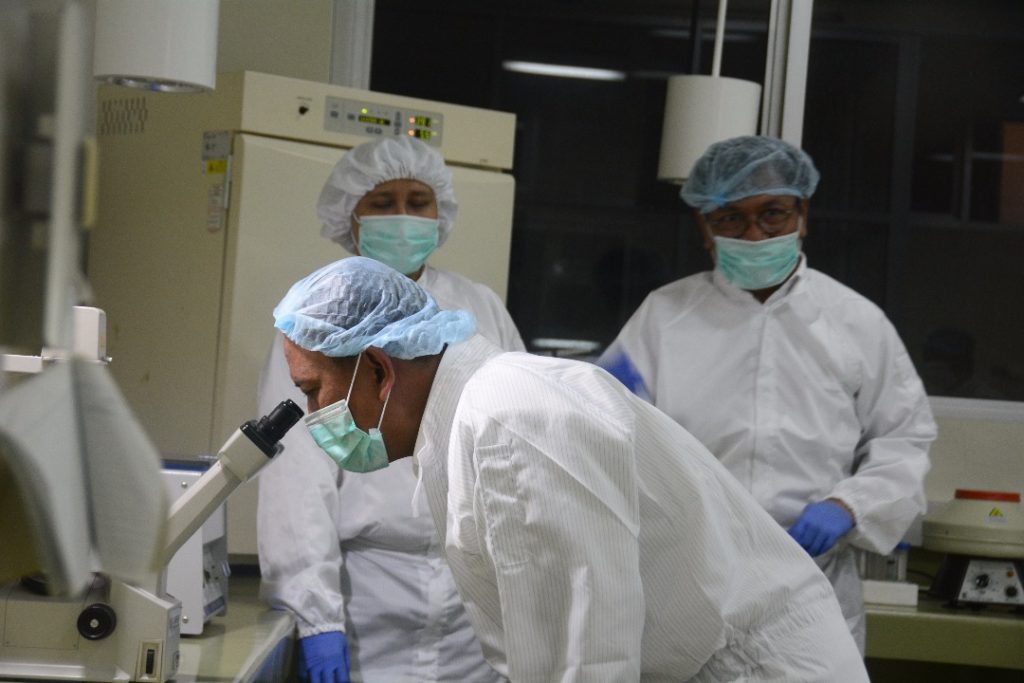Prof. Maria Lucia Inge, Balances Roles of Researcher and Mother
Women in this era have to perform difficult task, their roles are not merely to look after and take care of their family, but also to work and build their career. Not a few women have essential position in the institution they lead. Her office room was well-organized and simple, Prof. Maria Lucia Inge Lusida, dr., M.Kes., Ph.D had spared some time in her busy schedule. She shared some stories about her career as a researcher as well as the Head of Ketua Institute of Tropical Disease Universitas Airlangga, Surabaya. Since she started learning at Faculty of Medicine UNAIR in 1984, she has never imagined herself to be a researcher as well as a professor like she is now. She felt like the common medical students, going to classes regularly and discussing things with friends. But, after she finished bachelor program, she did not have the chance to serve in the community. “I had to wait for my turn. At that time, my husband had come back from service, it was known as Inpres. If I had gone, I would have been far from my husband. So, I became a lecturer and taught,” said Inge reminiscing. Inge was named as the professor on Clinical Microbiology FK UNAIR on July, 24 2010. She was conferred as UNAIR 388th professor or 96th since UNAIR had become a State University Acting as Legal Entity (PTN-BH). Inge, which was the secretary of ITD UNAIR when she was conferred as a professor, presented her scientific speech entitled “Peran Pemeriksaan Berbasis Biologi Molekuler dalam Upaya Penanggulangan Hepatitis B di Indonesia (Roles of Medical Test Based on Molecular Biology in the Effort to Eradicate Hepatitis B in Indonesia)”. The lecturer who has started her career in 1986 has conducted many researches on Hepatitis A, Hepatitis B, and Hepatitis C. There are at least 26 titles of her researches on Hepatitis which had been published. “I was interested in molecular biology because there were still many diseases in Indonesia which were caused by fungi infection, virus and bacteria so I wanted to develop the researches on molecular biology,” said the doctor graduated from Kobe, Japan. Some of her researches published in 2015 were “Hepatitis B virus infection in Indonesia 21(38): 10714 – 10720 World J Gastroenterol”, and “A Deep-sequencing Method Detects Drug-Resistant Mutations in the Hepatitis B Virus in Indonesians 57:384-92 Intervirology”. As an active researcher in campus, Inge hoped that the government fully support the researches for the development of Education. Furthermore, the target to be a world class university is difficult without the government’s support. “As a lecturer, the research activity must be active. With the ongoing research, education will develop too,” said the professor on Clinical Microbiology FK UNAIR. Her concern to research field made her commit to make ITD UNAIR as the University Science and Technology Excellence Center (PUI-PT). She also had a big hope for other institute in UNAIR to catch up ITD’s success as PUI-PT. “At this moment, ITD UNAIR was the only institution in UNAIR as PUI-PT, I hoped that in the future there will be more institutes from UNAIR to be PUI-PT,” she said. Balance Even though Inge is at the peak of her career, she needs supports from families especially at the current position she is in. She has to manages the institute which was named as Science and Technology Excellence Center on medical field from the Ministry of Research, Technology, and Higher Education in December 2015. Besides research, she also teaches and carries out her job as a doctor. Being women is not an easy task. They were given responsibilities to look after their children. In addition, they also build their career at work. Inge emphasized that education is the main key for women. She is against the opinion which says only men can study as high as possible. For her, gender equality should also apply in Education. “At that time, Kartini struggled for women’s education. It still has its relevance now. Education for women and men should not be different. Women are mothers. They will nurture the next generation,” she said. Inge stated that it was not an easy task to do things simultaneously, especially in the beginning of career. But, she just follows the rhythm at campus and family life. For her, the key is to balance career and family. “If a woman has a career, both roles should successfully carried out. Family should be managed and career should run professionally. It is not easy indeed especially in the beginning, but both should work at best as time will never turn us back,” said Inge. (*) Author: Defrina Sukma S Editor: Nuri Hermawan










